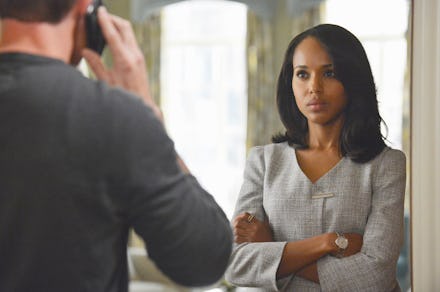7 Reasons to Shut Down Anyone Who Says 'Scandal' Is Just a Soap Opera

Scandal returns on Thursday with the second half of its third season, and fans can't contain their excitement.
But it seems some people would rather the #Gladiators stay quiet.
The show is often disparaged unjustly — people call it a soap opera because of its melodramatic plot. But they have no idea what they're talking about, because it's one of the smartest, most progressive shows on TV: The show may be gripping, but it's actually incredibly advanced in its representations of diversity.
To celebrate the return of Olivia, Fitz and Darby Stanchfield's mole, here are seven ways Scandal has improved TV way more than the haters let on:
1. It makes sexuality an afterthought.
Cyrus Beane is a lot of things — the White House Chief of Staff, a workaholic and the guy you call when you need to clean up a murder. He's also gay, but that's not the point. His sexuality gets less attention than his day job, and the show's choice to treat it as an aside is incredibly progressive.
Creator Shonda Rhimes has said that the character's marital choice wasn't part of her original plan, which may explain why Cyrus' marital issues are never related to him being gay — they're related to him being a total jerk. Now that's equality.
2. It treats race like an afterthought, too.
Similar to Cyrus' sexual preference, Olivia Pope's race is essentially a non-issue. When other characters talk about Olivia, they dissect her professional skills and gossip-worthy love life — not her skin color. The New Yorker calls Scandal a "post-racial fantasy," and that's a good thing.
3. It features feminists of all shapes and sizes.
Hollywood is slowly starting to understand that "feminist" is not a dirty word, but Scandal creator Shonda Rhimes has known that for quite some time.
Rhimes' female characters speckle the map. They range from career women in love with married men to pro-life Republicans who kill their husbands. Though the validity of either camp's feminism is up for debate, Scandal relies on shades of gray in its portrayal of strong female characters. Their gender is treated as neutral, and their actions prove that seeking out a corporate position, a higher political rank or an orgasm doesn't make you any less of a feminist than shaving your armpits.
4. It doesn't take rape lightly.
Season three is Scandal's craziest plot-wise, and one of its most traumatic moments involves First Lady Mellie's rape. The scene is gut-wrenching, but the morning after the assault, she makes the conscious decision to keep the events to herself.
Critics claim that the show followed trends of using sexual assault and silent victims as plot devices and easy exits, but its authenticity in portraying these brutal events is worth praising — her silence is only another level of pain that isn't overlooked — it's impossible to forget.
5. It let Lisa Kudrow rip American sexism to shreds.
Leave it to Phoebe to tell it like it is. Lisa Kudrow only joined Scandal for a few episodes to play senator Josephine Marcus, but one of them happened to contain the show's most memorable monologue — an astute feminist tirade about how Americans tend to "speak in code" about gender. Kudrow's delivery is fantastic, but it's Kerry Washington's glance of agreement during the speech that makes this moment stick.
Teamwork feminism is the best feminism.
6. It rocks the female anti-hero.
Breaking Bad and House of Cards set Americans on a bad guy binge, but bad girls are a trickier genre to crack. Olivia Pope does it by misleading us. We're told every few episodes that she "wears the white hat," but she's rigged elections, denied information that could have saved a mother's life and had an on-going affair. It's not gender stereotypes that mask Olivia's dark side — Rhimes described Scandal's characters as "monsters running around in human skin," and it's their ethical shortcomings that make it easy to forget Olivia's. But Olivia Pope still leads her gladiators — let's not forget what "gladiator" means.
7. It mocks everything that's wrong with American politics.
It's easy to focus on the long looks shared by star-crossed lovers, but much of Scandal is sneakily satire. The government hardly governs — only once have foreign affairs made their way into the plot line. And, of course, POTUS's affair with Pope gives a whole new meaning to "domestic affairs."
Though Fitz has a party affiliation and charisma, he has done little in terms of policy. The NSA drama is not a matter of national security, but selfish image-control. When terrorist attacks and murders are concealed with a flick of the wrist, it's easy to dismiss the show as "lazy," but the critique implied in Rhimes' vision reminds us that our government is seriously flawed. Scandal's government is more of a PR agency than a governing body.
It's hyperbole, sure. But it's not wrong, and it's only one of the many ways that this show is far smarter than critics let on.